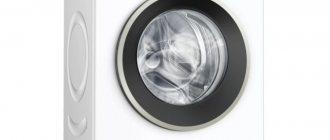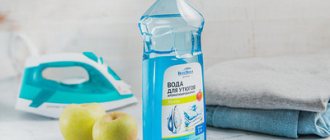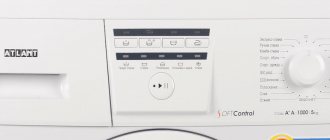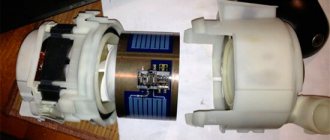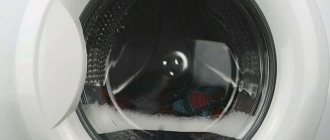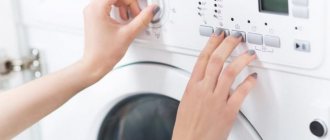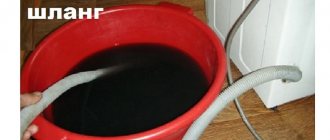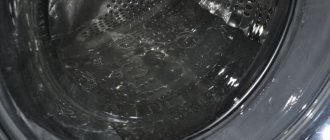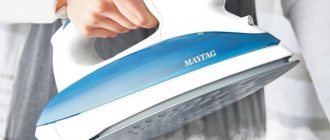Today, the washing machine has become an indispensable assistant in everyday life. Various washing modes in cold and hot water: fast, delicate and intensive wash any laundry perfectly. Washing in hard water significantly degrades the quality, the laundry becomes hard and dirt is practically not washed out. When washing with hot water, scale forms, which damages machine parts. Due to scale, the heating element overheats, which can lead to its combustion. For effective washing, be sure to use water softener for washing machine. In soft water, the powder dissolves better and the laundry is washed more efficiently, and the machine parts do not deteriorate.
Do I need to soften the water for washing?
Washing machines need regular cleaning. Hard water is the cause of plaque on machine elements located in a humid environment. How to understand what kind of water is in your water supply? If you do not resort to any special determination methods, the following will be intensively formed in the machine:
- Scale;
- Soap scum;
- Unpleasant smell.
If these signs appear, you should consider softeners. By making the water softer, you can extend the life of your washing machine and improve the quality of washing.
Magnetic water softener
Magnetic balls are used to soften water for washing machines. This is a kind of filter that neutralizes molecules of salts and metals, thereby softening the water. Using this method of water softening will preserve the household appliance, reduce the amount of limescale deposits on the internal parts of the unit, and increase its service life.
Related article: Filter for water meter
This is an effective means for softening water; the principle of its operation is to change the composition of the liquid due to the influence of magnetic fields. In addition, this softener eliminates harmful impurities contained in water.
The filter is a cylinder equipped with permanent magnets, due to which salts and metals lose the ability to “stick” to the heating elements of various devices, and existing deposits are loosened and easily cleaned off.
For water cleaning to be effective, the pressure should not be stronger than 4 m/s. Most often, magnetic softeners are installed in boiler rooms.
What is hardness?
This indicator is determined by the concentration of calcium and magnesium salts dissolved in water. When boiled, they, or rather, part of them, are transformed into a sediment - scale. You can observe this process in any kettle for boiling water. From the value assigned to the technical fluid that flows through water pipes:
- Soft;
- Normal;
- Moderately hard;
- Very tough.
Washing in conditions of high rigidity negatively affects the fabric and requires increased consumption of detergents.
After washing, the fabric turns yellow and becomes rough - magnesium and calcium soap settles on it. Due to the uneven wetting characteristic of hard water, the fabric sheds unevenly. After several such washes, the item becomes unusable.
Chemical compositions
Calgon is the most popular product used to soften water. But his fame is based not on miraculous qualities, but on advertising videos.
In fact, if you carefully study its constituent components, you can understand that the same substances that can reduce the level of water hardness are present in any washing powder considered to be of high quality.
And all that remains is to use the powder according to the manufacturer’s recommendations, which are indicated on the packaging container, and not spend extra money after listening to enough advertising.
One thing to remember is that the rate of detergent consumption will depend on the hardness of the water.
The older generation is well aware that water can be softened using ordinary soda, which should be mixed into the powder. This folk method perfectly saves the parts of the washing machine, but has a negative effect on things made from natural materials. So you need to use soda thoughtfully and carefully.
Simple laundry soap will soften water perfectly. It is simply added to the powder composition. But this method is not suitable for children's clothes, because laundry soap has the property of drying the skin.
How to determine hardness?
The easiest way is to use a special card. You can also use a conductometer - this is a device for measuring electrical conductivity. It is also called a “salt meter”. The higher the number on the screen, the more salts and harder the liquid. What signs can be used to judge an increased concentration of salts:
- Detergents do not foam well;
- Scale forms in the kettle after just a few boils;
- Bitter taste - however, not everyone feels it;
- The formation of a white coating on the walls of the container after settling.
What should the water hardness be?
It is measured in degrees of hardness, volume fractions or mass number. The officially accepted unit of measurement (SI system) is mol/m³. In fact, another unit of measurement is more often used - milliequivalent/liter. Water is distinguished, mEq/l:
- Soft - less than 2;
- Normal - 2-4;
- Hard - 4-6;
- Very hard - 6 and above.
Three types are distinguished by degrees of hardness:
- Soft - less than 2;
- Average - 2-10;
- Very hard - more than 10.
In Russia, unfortunately, the norm is considered to be 7 mEq/L. In Europe, this figure is 1-2 mg-eq/l. That is, liquid flows through our pipes, which needs to be softened.
How to soften water?
There are two categories of ways to make hard water soft at home - mechanical and chemical. Let's take a closer look at them.
Chemical methods
- Softening agents. The most popular in Russia is “Kalgon 2 in 1”. With its help you can protect heating elements, drums, and plastic hoses from scale. The dosage depends on the concentration of salts. Leading European manufacturers recommend using Calgon. True, it itself does not remove scale - it only prevents its formation, providing a softening effect. It does not guarantee complete protection of the washing machine.
- Special washing powders. They contain softeners. These are Persil, Ariel and others powders. They can extend the life of the machine quite well.
Mechanical methods
To increase softness, various systems are used that can handle large volumes of liquid. They are connected directly to the water supply. There are:
- Membrane filter. They are also called reverse osmosis systems. Water passes through them under pressure. It overcomes the membrane that traps molecules of all substances. The membrane only allows water molecules to pass through. Such filters are used only for household needs, as they also remove substances that are important for the body.
- Magnetic softener. They are installed on highways and water pipes. Salt dissolved in the liquid, under the influence of a magnetic field, enters the sump. An electromagnetic softener works in a similar way - in it the salts are affected by the electromagnetic field.
- Ion exchange systems. They cope with any tasks. One reagent is an ion exchange resin, the second is a saline solution. They are separated - they are in different containers. These high-performance systems are easy to maintain. The disadvantage is that the reagents need to be changed periodically.
- Salt filter. Cheap and accessible. The reagent is polyphosphate crystals. It improves the quality of washing quite well.
How to soften water in a washing machine?
Special products designed to effectively soften hard water in a washing machine are offered by users and specialists. Traditional methods, chemical products and special devices protect household appliances from plaque and deposits.
Traditional methods of water softening
Users offer several options for reducing water hardness. And they all work!
Soda ash + washing powder
Soda in the amount of 1 tsp. Add to measuring cup of powder. This water is good for removing stains from dense materials.
Important! If there is an excess of soda ash, the fibers of natural fabric are destroyed.
Laundry soap
You will need 150 g of shavings from this product. It is dissolved in 5 liters of water in the evening. The composition is poured into a large tank and infused until the morning. You need to drain the washing gel without sediment, and then add 2-3 tsp to it. boric acid.
Important! The product should not be used on children's clothing - laundry soap is not suitable for delicate skin.
Wood ash
To soften water, you can use 2.5 g of ash per 1 liter of water. The components are thoroughly mixed and infused for 8-12 hours.
Advice! It is best to use ash from sunflower, corn, beech and oak.
Lemon acid
You will need 80 g of citric acid, which is poured into the drum. Select a 95 degree program - things become soft and stains are removed better.
Gargling in a bite
1 tbsp. The product is added during the rinse program. Vinegar neutralizes residual calcium-magnesium salts.
Washing powder + laundry soap
For 1 liter of water you will need 3 g of soap, which is mixed with a measuring spoon of powder. The solution is allowed to settle overnight and then used for washing.
Salt tablets
1 tablet of salt can be used to remove scale or soften water. It is thrown into the drum, and washing is done without laundry.
“Cold” method of water softening
A folk method that is recommended to be used exclusively for hand washing. You will need:
- Fill half of a large tank or metal tub with water.
- Leave the water outside for 1 week in the shade.
- Check for sediment at the bottom.
- Carefully drain the water without sediment.
Important! Alkaline earth metal salts lose activity at low temperatures, so the water will be very soft.
Use of chemicals
How can you soften hard water in a household washing machine if there is no trust in traditional methods? It is worth using chemical products:
- Calgon 2-in-1. The gel composition will 100% protect the drum, heating element and plastic pipes, but will perfectly soften the water and prevent scale from forming;
- washing powders with a softening effect. Used in dosages strictly specified by the manufacturer;
- Doctor TEN. Multifunctional product in powder form. Removes scale, detergent residues, odors, softens water.
Interesting to know! Brands Whirlpool, Bosch, Siemens recommend only Calgon softener for their household appliances.
Applying filters
Modern manufacturers install an anti-scale filter for automatic washing machines. The mesh element is located at the junction of the water intake hose with the housing. It does not prevent the access of small particles, but it prevents rust from getting into the water. It is more advisable to use additional systems.
Salt (polyphosphate) devices
Polyphosphate crystals are enclosed in a special plastic container. It is installed by inserting it into the water supply system or into the inlet hose. The operating principle of the device is to soften water with crystals through a chemical reaction. Due to the absorption of reagents, the water becomes soft and does not harm the components of the washing machine.
Important! Water filtered with polyphosphates can only be used for washing.
Reverse osmosis systems
Osmosis filters remove impurities with dense fractions from water, which helps soften and purify. Systems are made with several compartments:
- preliminary preparation. The block contains 3-4 cartridge filters that remove chlorine, heavy metals, pesticides, mechanical impurities and petroleum products from water;
- reverse osmosis. The housing with an internal membrane subtly removes organic matter, inorganic compounds and bacteria. Clean water, entering through the membrane, is mixed with contaminated water, and then passed through the filter again;
- storage capacity up to 10 liters. Filled with clean water, the amount of which is controlled using a membrane;
- faucet Attaches to the sink and filter container. By turning the lever, you can draw purified and soft water.
Related article: Water filtration installation
Important! A reverse osmosis filter can only be installed in a water supply with a pressure of 3.-3.5 bar.
Magnetic structures
They are used for the treatment of industrial and drinking water through the attraction of metal ions. Salt deposits of calcium and magnesium settle on the filter, and the liquid can be used for washing. Magnetic models are designed as covers and mounted on pipes.
Important! Magnetic filters are suitable for water purification exclusively for washing purposes.
Ion exchange devices
Ion exchangers are a plastic container with ion resin granules and a salt tank. When passing through the filter, metal molecules “stick” to the resin granules, and clean water is supplied through the tube.
Advice! Change the reagents on the filter every 3-4 years and set the cleaning program to night time.
"Folk remedies
Along with special compounds produced by industry, improvised means can be used to soften what comes from the water supply. They are in every home, cheap and safe.
How to soften water with soda?
Many housewives are interested in whether soda softens water? As soon as this inexpensive and safe product is used on the farm. And in this case it could not have happened without him. Any soda will help - baking soda or ash. The first one is even used for washing. Soda ash is more aggressive and has bleaching properties. For 10-15 liters of liquid, two tsp is enough. You can add soda by mixing it with washing powder in advance - it will foam better and remove stubborn stains better. Soda ash is not only an excellent laundry softener - by improving the quality of washing, it will also protect machine parts from scale.
Important! Soda ash is suitable for natural fabrics - linen and cotton. It is not recommended to use it for wool, silk and synthetics - it can ruin things.
How to soften water with soap?
You can use any soap - laundry or cosmetic. It needs to be grated. For one wash, 15-20 g is enough - a heaped tablespoon. After diluting the soap in a half-liter container, foam should appear. This composition is enough for 10-12 liters.
What else can you use?
Citric acid and vinegar have softening properties, but at the same time increase the acidity of the environment. Typically, citric acid is used to remove salt deposits. Of course, you cannot wash with vinegar - it has an unpleasant odor that is difficult to remove even after a single use. It will come in handy as a descaling agent.
Table salt is also a good softener. Housewives can use special tableted salt - it is convenient for washing.
